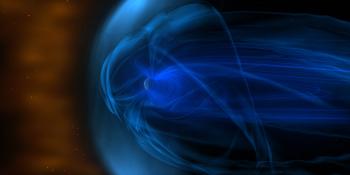Viewing archive of Wednesday, 4 August 2010
Solar activity report
Any mentioned solar flare in this report has a scaling factor applied by the Space Weather Prediction Center (SWPC). Because of the SWPC scaling factor, solar flares are reported as 42% smaller than for the science quality data. The scaling factor has been removed from our archived solar flare data to reflect the true physical units.
Report of Solar-Geophysical Activity 2010 Aug 04 2201 UTCPrepared by the NOAA © SWPC and processed by SpaceWeatherLive.com
Joint USAF/NOAA Report of Solar and Geophysical Activity
SDF Number 216 Issued at 2200Z on 04 Aug 2010IA. Analysis of Solar Active Regions and Activity from 03-2100Z to 04-2100Z
Solar activity remained at very low levels. New Region
1093 (N10E63) produced a few B-class flares as it rotated into view
and was classified as a Cao-type group with a beta magnetic
configuration. Region 1092 (N14W15) was quiet and stable during the
period.
IB. Solar Activity Forecast
Solar activity is expected to be very
low. However, there will be a chance for an isolated C-class flare
from Region 1093.
IIA. Geophysical Activity Summary 03-2100Z to 04-2100Z
Geomagnetic field activity ranged from unsettled to major storm
levels due to a CME passage associated with a long-duration C3 flare
on 01 August. The major storm levels occurred during 03/2100 -
04/0300Z and were associated with increased solar wind velocities
(peak 657 km/s), increased IMF BT (peak 18 nT), and a sustained
period of southward IMF Bz (peak deflection -13 nT). Activity was at
unsettled to minor storm levels after 04/0300Z. The greater than 2
MeV electron flux at geosynchronous orbit decreased to normal to
moderate levels.
IIB. Geophysical Activity Forecast
Geomagnetic field activity is
expected to be at unsettled to active levels until midday on day 1
(05 August). Activity is forecast to increase to active to minor
storm levels with a chance for major storm levels beginning midday
on 05 August due to the expected arrival of a CME associated with a
large filament disappearance on 01 August. Activity is expected to
decrease to unsettled to minor storm levels on day 2 (06 August) as
the CME passage continues. A further decrease to quiet to unsettled
levels is expected on day 3 (07 August).
III. Event Probabilities 05 Aug to 07 Aug
| Class M | 05% | 05% | 05% |
| Class X | 01% | 01% | 01% |
| Proton | 01% | 01% | 01% |
| PCAF | green | ||
IV. Penticton 10.7 cm Flux
Observed 04 Aug 081 Predicted 05 Aug-07 Aug 082/084/084 90 Day Mean 04 Aug 075
V. Geomagnetic A Indices
Observed Afr/Ap 03 Aug 014/020 Estimated Afr/Ap 04 Aug 027/030 Predicted Afr/Ap 05 Aug-07 Aug 030/035-020/020-007/007
VI. Geomagnetic Activity Probabilities 05 Aug to 07 Aug
| A. Middle Latitudes | |||
|---|---|---|---|
| Active | 30% | 30% | 20% |
| Minor storm | 40% | 25% | 05% |
| Major-severe storm | 20% | 05% | 01% |
| B. High Latitudes | |||
|---|---|---|---|
| Active | 15% | 40% | 25% |
| Minor storm | 45% | 30% | 10% |
| Major-severe storm | 30% | 10% | 01% |
All times in UTC
Latest news
Latest forum messages
2025/04/12-13 Filament CMEs 2025/04/16 G3 Watch 341AR4064 2Incoming & Unnumbered Active Regions 1739AR 4060 31AR4062 32
More topicsSupport SpaceWeatherLive.com!
A lot of people come to SpaceWeatherLive to follow the Sun's activity or if there is aurora to be seen, but with more traffic comes higher server costs. Consider a donation if you enjoy SpaceWeatherLive so we can keep the website online!

Space weather facts
| Last X-flare | 2025/03/28 | X1.1 |
| Last M-flare | 2025/04/15 | M1.2 |
| Last geomagnetic storm | 2025/04/15 | Kp6+ (G2) |
| Spotless days | |
|---|---|
| Last spotless day | 2022/06/08 |
| Monthly mean Sunspot Number | |
|---|---|
| March 2025 | 134.2 -20.4 |
| April 2025 | 124.1 -10.1 |
| Last 30 days | 124.7 -16.6 |


